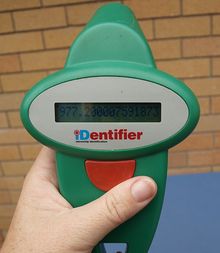Starting in 2018, the Unwanted Horse Coalition (UHC) will be offering a new service to its popular Operation Gelding program called “Operation Chip.” This program will be an addition to Operation Gelding.

A microchip scanner
Starting in 2018, the Unwanted Horse Coalition will be offering a new service to its popular Operation Gelding program called “Operation Chip.
© 2018 by Oscar111
“The industry as a whole is moving towards microchipping as the preferred method of identification,” said UHC Director Ashley Furst. “Initially, organizations hosting Operation Gelding clinics will be eligible to apply for microchips for Operation Chip.
Eventually we hope to expand the program to be able to offer rescue organizations the opportunity to apply for just the chips to be inserted into the horses in their care.
Microchipping horses in rescue organizations is one of the best ways to be able to track them through the system, as well as give the industry the ability to reunite them with their owner in the case of a natural disaster.”
The UHC has partnered with MicrochipID Equine to provide the microchips for the program. The chips provided will come with a chip syringe, as well as a pre-paid registration card, and the veterinarian providing the gelding services at the clinic will be responsible for inserting the chips.
“To ensure the horses are getting registered, the UHC will also be covering the cost of registration for each chip that is put into a horse,” said Furst. “A survey of rescues that have participated in Operation Gelding showed that only 50% of rescues are scanning horses for chips upon intake.
The cost of scanners can be prohibitive for rescues, so as a result the UHC will also be providing eligible 501c3 rescues with an opportunity to apply for a deeply discounted scanner.”
The UHC is able to provide the scanners and chips to participants due to the generosity of The Right Horse Initiative. “The Right Horse Initiative is proud to support the UHC in its efforts to provide a more robust identification system in equine welfare,” said Christy Counts, President of The Right Horse.
“Lack of identification is a major barrier to safe transitions for horses in this country. Providing easy access to microchipping for horse owners and horse rescues is a relatively easy and inexpensive solution to achieving our collaborative goal of providing opportunities for at-risk horses.”
Information about Operation Chip and how to apply can be found on the UHC website here: http://www.unwantedhorsecoalition.org/operation-chip/. For any questions, please contact UHC Director Ashley Furst at 202-846-1607 or afurst@horsecouncil.org
About the Unwanted Horse Coalition
The Unwanted Horse Coalition represents a broad alliance of equine organizations that have joined together to educate the horse industry about the unwanted horse issue.
The UHC was a direct result of the Unwanted Horse Summit, which was organized by the American Association of Equine Practitioners and held in conjunction with the American Horse Council’s annual meeting in Washington, D.C., in April 2005.
The summit was held to bring key stakeholders together to start a dialogue on the plight of the unwanted horse, defined as any horse no longer wanted by its current owner. Operating under the American Horse Council Foundation, the UHC provides resources to prospective owners, current owners, rehoming facilities, and industry leaders in its effort to encourage responsible ownership.
